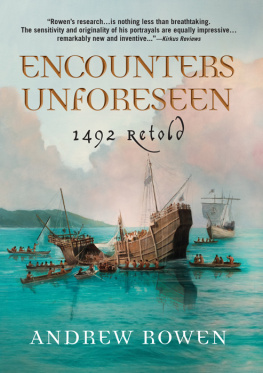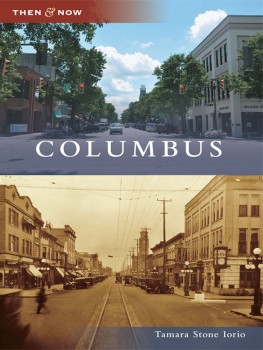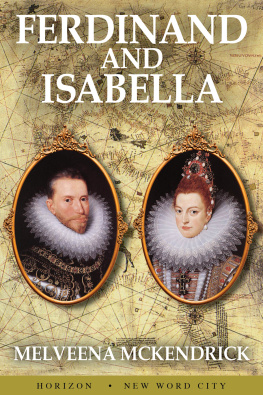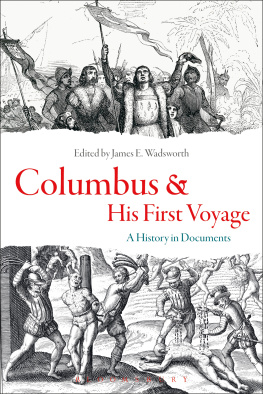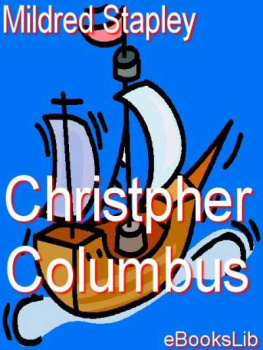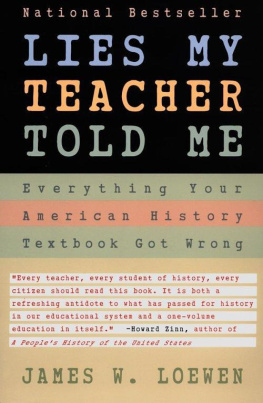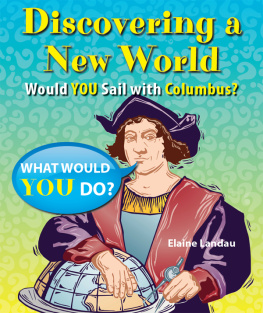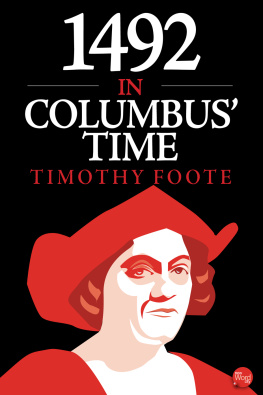Andrew Rowen - Encounters Unforeseen: 1492 Retold
Here you can read online Andrew Rowen - Encounters Unforeseen: 1492 Retold full text of the book (entire story) in english for free. Download pdf and epub, get meaning, cover and reviews about this ebook. year: 2017, publisher: Andrew S. Rowen, genre: Home and family. Description of the work, (preface) as well as reviews are available. Best literature library LitArk.com created for fans of good reading and offers a wide selection of genres:
Romance novel
Science fiction
Adventure
Detective
Science
History
Home and family
Prose
Art
Politics
Computer
Non-fiction
Religion
Business
Children
Humor
Choose a favorite category and find really read worthwhile books. Enjoy immersion in the world of imagination, feel the emotions of the characters or learn something new for yourself, make an fascinating discovery.
- Book:Encounters Unforeseen: 1492 Retold
- Author:
- Publisher:Andrew S. Rowen
- Genre:
- Year:2017
- Rating:5 / 5
- Favourites:Add to favourites
- Your mark:
Encounters Unforeseen: 1492 Retold: summary, description and annotation
We offer to read an annotation, description, summary or preface (depends on what the author of the book "Encounters Unforeseen: 1492 Retold" wrote himself). If you haven't found the necessary information about the book — write in the comments, we will try to find it.
After 525 years, the traditional literature recounting the history of Columbuss epic voyage and first encounters with Native Americans remains Eurocentric, focused principallywhether pro- or anti-Columbuson Columbus and the European perspective. A historical novel,Encounters Unforeseen: 1492 Retoldnow dramatizes these events from a bicultural perspective, fictionalizing the beliefs, thoughts, and actions of the Native Americans who met Columbus side by side with those of Columbus and other Europeans, all based on a close reading of ColumbussJournal, other primary sources, and anthropological studies.
The drama alternates among three Tano chieftainsCaonab, Guacanagar, and Guarionexand a Tano youth Columbus captures, Spains Queen Isabella and King Ferdinand, and Columbus himself. It depicts the education, loves and marriages, and other life experiences each brought to the unforeseen encounters and then their astonishment, fears, and objectives in 1492 and 1493. The focus includes the Tano discovery of Europe, when Columbus hauls the captive and other Tanos back to Spain, as well as the chieftains reactions to the abusive garrison of seamen Columbus leaves behind in the Caribbean. Throughout, the Tano protagonists are neither merely victims nor statistics, but personalities and actors comparable to the European, and their side of the story is forcefully told.
The novel weaves a fascinating tapestry of scenes and dialogues from the historical record, often incorporating text from primary sources. Isabella plots her dynastic marriage, argues with Ferdinand over whos supreme, and wages war to expand their kingdoms. The chieftains take multiple wives to consolidate their rules, vie to marry the beautiful Anacaona, and battle Caribe raiders. An unknown Columbus conceives a fanciful voyage, marries advantageously to promote it, and yet suffers an agonizing decade of ridicule and rejection. Guacanagar rescues Columbus when theSanta Marasinks, but Caonab questions Guacanagars generosity, and Guarionex is vexed, having witnessed a religious prophecy of Tano genocide inflicted by a clothed people. Columbus teaches his captive Christianity, initiating the following centuries collision of Christianity with Native American religion and spirits.
The Tano stories depict both events known to have occurred (e.g., the chieftains ascensions to power, the prophecy of genocide, the captives baptism in Spain) and known practices or experiences (e.g., inter-island canoe travel, a hurricane, a Caribe wife raid, a batey game). The Isabella and Ferdinand stories include their establishment of the Inquisition, subjugation and Christianization of the Canary Islands, completion of the Reconquista, and expulsion of the Jews from Spain, illustrating European doctrines of conquest, enslavement, and involuntary conversion and how the sovereigns ruled over Old World peoples before encountering Native Americans. The Columbus stories portray his pre-1492 sailing experiences and the evolution of his world outlook, and his thoughts during the encounters embody the concepts underlying the European subjugation of Native Americans over the following centuries. Stark societal differences are illustrated, with the Europeans practicing African slavery and the Tanos sharing food as communal property.
A Sources section briefly discusses interpretations of historians and anthropologists contrary to the authors presentation, as well as issues of academic disagreement.
Andrew Rowen: author's other books
Who wrote Encounters Unforeseen: 1492 Retold? Find out the surname, the name of the author of the book and a list of all author's works by series.

